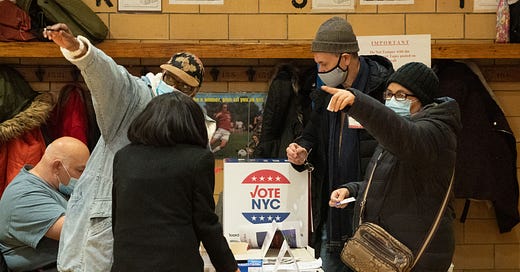Meet the Group Trying to Get More People to Volunteer as Poll Workers
‘Power the Polls’ is making it easier to step up and help tend democracy.

IN THE 2020 PRESIDENTIAL ELECTION, 155,508,985 people voted. That figure doesn’t include the 2020 primary elections or the other votes cast that year in Senate, House, gubernatorial, state legislative, and local races, or referenda, initiatives, state constitutional amendments, and other ballot measures. That’s a lot of votes, and it takes a lot of people to run the system that collects and tallies them all.
Four years earlier, in 2016, when there were about 17 percent fewer votes cast in the general election for president, there were “116,990 polling places, including 8,616 early voting locations, across the country. These polling sites were operated by 917,694 poll workers.” That may sound like plenty of people to staff the country’s elections, but in fact, according to the Election Assistance Commission, “nearly 65 percent of jurisdictions reported that it was ‘very difficult’ or ‘somewhat difficult’ to obtain a sufficient number of poll workers.”
And in the years since 2016, the situation has gotten worse. The number of volunteer poll workers has fallen off a cliff, largely due to the pandemic. Poll workers tended to be older and more susceptible to COVID-19, and every year, some longtime poll workers call it quits and retire.
Facing the prospect of a chaotic election starved of manpower, in June 2020 “a coalition of businesses and nonprofits” launched Power the Polls, a “nonpartisan initiative to recruit the next generation of poll workers to ensure safe and fair elections for all voters.” Its founding partners include MTV, United Way, Levi Strauss, Patagonia, and Civic Alliance, among others. Dozens of other companies and organizations have joined since. With its various partners, Power the Polls tries to engage with civic and business organizations to encourage people to learn more about working the polls—hopefully convincing some to reach out to their local registrars about sitting on the other side of the elections table. In the 2020 election, almost three quarters of a million people signed up, nearly triple the group’s goal. In 2022, they added another quarter million.
Local governments are in charge of choosing who staffs the voting booths and training them, but Power the Polls helps an organization’s employees spread over a wide area quickly connect with their local elections officials to sign up. When a company like Target, a Power the Polls partner, with more than 400,000 employees across 1,900 stores in all fifty states and the District of Columbia, encourages its employees to consider serving at the polls, it can make a significant impact on how well elections run. Power the Polls knows whom to contact, no matter where an employee who signals interest is located.
In some cases—where it’s legal—municipalities facing a personnel shortage can ask Power the Polls to help with recruiting volunteers. In addition to directing volunteers to the correct local elections office, Power the Polls also keeps a database of people who have expressed interest but haven’t officially signed up yet, in case of a shortage.
“Of course, every cycle there is going to be turnover. . . . People will move, people have life stuff come up, you know, they can’t always come back,” Marta Hanson, the national program manager at Power the Polls, told The Bulwark. “So what we’ve heard from election administrators is that they always do appreciate those fresh names and fresh people who were able to step up and serve. And at the same time, from what we’ve seen at least, people overwhelmingly have a positive experience and want to come back.” And there is evidence to back that up, with 95 percent of volunteers surveyed last year by Power the Polls reporting that they had a positive experience, and 88 percent saying they are interested in volunteering again.
One testimonial from a Power the Polls volunteer, shared with me by the group, stuck out: “It is my patriotic privilege to assist people in casting their votes. It was an honor to serve and am looking forward to the next election to enlist my services again. Thank you for the experience.”
As it happens, my younger sister has been a volunteer poll worker, and she added that, in addition to a sense of pride and service, it was nice that “they pay you for your time, too.” (That’s true in some jurisdictions, but not all, and even then, as my sister notes, it’s “more like a partial reimbursement.”) Some employers even offer paid time off to volunteer.
Of course, adding more people at the polls won’t solve everything that ails our elections. It’s not clear that more volunteers will generate more trust in elections or help repudiate false claims of fraud. Nor can they prevent failed candidates from trying to overturn elections through the courts or other means.
Still, having the polls fully staffed with people who know what they are doing can make voting a less frustrating experience and less prone to problems. And it can be gratifying to know that you’re doing your bit to help support the central act of our democracy. (If you’re interested, you can sign up here.)
“I have always done my civic duty and voted but didn’t know what went on behind the scenes,” said another volunteer in a testimonial. “This experience brought the voting process to life. . . . I am beyond grateful to live in a country where we have this opportunity.”




